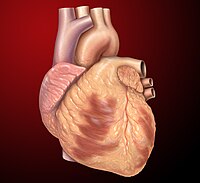
Photo from wikipedia
Amyloidosis is the extracellular deposition of unique protein fibrils in different tissue organs. It is most commonly associated with B-cell malignancy such as multiple myeloma or Waldenstrom macroglobulinaemia. It involves… Click to show full abstract
Amyloidosis is the extracellular deposition of unique protein fibrils in different tissue organs. It is most commonly associated with B-cell malignancy such as multiple myeloma or Waldenstrom macroglobulinaemia. It involves the liver, heart, kidney, peripheral nerves and soft tissues. Liver however is affected, but clinically apparent disease is very rare. Hepatomegaly and mild elevation of alkaline phosphatase is the most common presentation in patients with liver involvement. Acute hepatic failure is a rare presentation with myeloma-induced amyloidosis. The diagnosis can be difficult requiring biopsy or sometimes special staining of the tissue. Management is still very challenging
Journal Title: BMJ Case Reports
Year Published: 2020
Link to full text (if available)
Share on Social Media: Sign Up to like & get
recommendations!